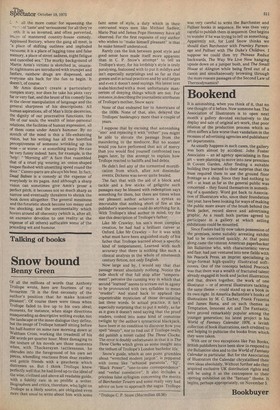Talking of books
Snow bound
Benny Green
Of all the millions of words that Anthony Trollope wrote, here are fourteen of my favourites: "It is the firstnecessity of the author's position that he make himself Pleasant". Of course there were times when Trollope failed to live up to his own ideal; moments, for instance, when stage directions masquerading as descriptive writing evoke, not the landscape or the inner dialogue they define, but the image of Trollope himself sitting before his half-hunter on some raw morning down at Waltham Cross, working the treadmill of his 250 words per quarter hour. More damaging to the texture of his novels are those moments when, with Thackerayan tactlessness, he obtrudes into the foreground of his own set pieces, wheedling reactions from dear readers and gentle friends with a gaucherie which distresses us. But I think Trollope knew perfectly well that he had lived up to the ideal of the wise, civilised and above all readable guide, with a fidelity rare in so prolific a writer. Biographers and critics, therefore, who light on Trollope as a likely source, are obligated even more than usual to write about him with some faint sense of style, a duty which in their contrasted ways men like Michael Sadleir, Mario Praz and James Pope Hennessy have all observed. For the first requisite of any author who wishes to "make himself pleasant" is that he make himself understood.
Rarely can the link between good style and good sense have made itself more apparent than in C. P. Snow's attempt* to tell us Trollope's story, for his lordship's style is truly paralysing, festooned with to put it mildlys and isn't especially surprisings and as far as that goeses and in actual practices and by and larges and even it doesn't need sayings. His latest text is also blotched with a most unfortunate mannerism of denying things which are not. For instance, in describing the journalistic attributes of Trollope's mother, Snow says: None of that endeared her to Americans of the 1830s. None of that, also, delayed the Trollopes' bankruptcy more than a couple of years.
I suppose that by excising that astonishing "also" and replacing it with "either" you might be able to elevate the passage from the maundering to the mediocre. But no sooner would you have performed that act of mercy than you would find yourself confronted two pages later, by this attempt to explain how Trollope reacted to bailiffs and bad debts: He didn't feel any of the tormented mortification from which, after not dissimilar events, Dickens was never quite healed. The fact that with the aid of a block and tackle and a few sticks of gelignite such passages may be blessed with redemption says something for them, but there are times when
our pleasant author achieves a syntax so.
inscrutable that nothing short of fire at the publisher's warehouse could do anything for it. With Trollope's ideal author in mind, try for size this description of Trollope's father; Like Mr Crawley, his son's most complex creation, he had had a brilliant career at Oxford. Like Mr Crawley — for it was with what must have been anguished study of his father that Trollope learned about a specific kind of temperament. Learned with such accuracy that there is nothing like such a clinical analysis in the whole of nineteenth century fiction, not only English.
Now large and by, I would say that that passage meant absolutely nothing.. Notice the rude shock of that full stop after "temperament"; perceive the cunning way in which that second "learned" seems to scream out in agony to be pronounced with two syllables to mean "erudite". And stand back to applaud the impenetrable mysticism of those devastating last three words. In actual practice, it isn't especially surprising that to put it mildly, as far as it goes it doesn't need saying that the proof readers, coshed into some kind of comatose twilight by the author's syntactical blackjack, have been in no condition to discover how you spell "sleazy", nor to tind out if Trollope really did publish a novel called The Three Clocks. The error is doubly unfortunate in that it is The Three Clerks which gives us some insight into the tedium of Trollope's London bachelor life.
Snow's guide, which at one point grumbles about "wretched modern jargon", is peppered with terms like "schizoid paranoia", "IQ", "Black Power", "one-to-one correspondence" and "verbal correlative". It also includes a priceless false syllogism concerning the merits of Barchester Towers and some really very bad advice on how to approach the sagas. Trollope
was very careful to write the Barchester and Palliser books in sequence. He was then very careful to publish them in sequence. One begins to wonder if he was trying to tell us something. Apparently not, for Lord Snow thinks we should start Barchester with Framley Parsonage and Palliser with The Duke's Children. I suppose we could then try Phineas Redux backwards, The Way We Live Now hanging upside down on a juniper bush, and The Small House at Alington while being fired out of a canon and simultaneously browsing through the more roseate passages of the Second Law of Thermodynamics?


































 Previous page
Previous page